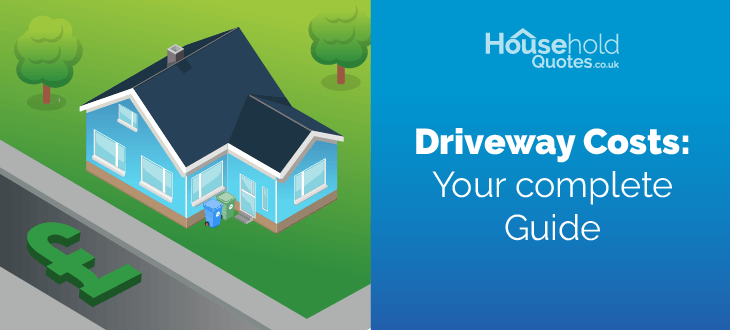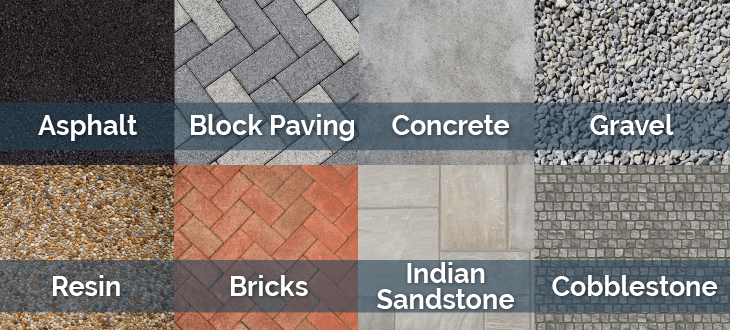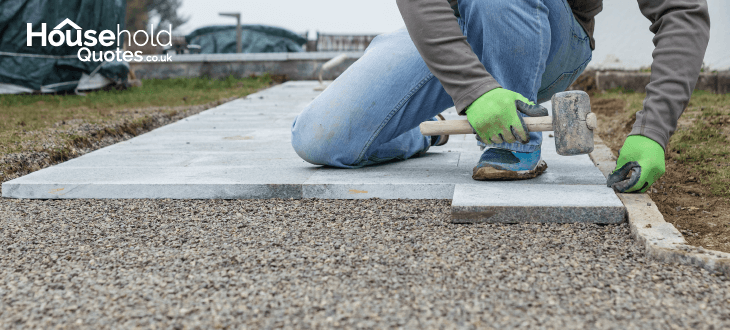
Tell us what you need to find a matching loft conversion specialist

Get free quotes from professionals near you

Compare offers and choose the one that best matches your need
- Householdquotes.co.uk
- Driveway
- Driveway Cost
Driveway Cost: Your Complete Guide For 2025


- The average cost of a driveway is between £6,150 and £17,500.
- The cost of driveways depends on the material chosen, the complexity of the project, the size, and your location.
- The cost of a two-car driveway is between £6,000 to £6,700, and has an area of around 30m2.
- Site preparation, excavation and groundwork contributes to 80% of the overall cost.
Are you ready to upgrade your driveway but hesitant about the cost? Our comprehensive guide for 2025 answers all your questions and concerns. Whether you're contemplating a stunning paving stone driveway or the affordability of gravel, our guide has got you covered.
By the end of our guide, you'll be equipped with everything you need to make an informed decision and create your dream driveway without compromising quality or style. Don't settle for a subpar entrance to your home when our guide can help you achieve the driveway of your dreams. Read on to discover the cost-effective options that will bring your driveway vision to life.
Are you ready for a new driveway? Household Quotes UK can help. Say goodbye to endless researching and vetting. Instead of spending hours surfing websites and scheduling phone calls with installers, simply fill out our online form in 30 seconds and receive up to four free quotes tailored to you. Click below to get started!
- Describe your needs
- Get free quotes
- Choose the best offer
It only takes 30 seconds

How much does a driveway cost?

In the UK, a new driveway costs between £6,150 and £17,500. The price is influenced by several factors, such as the size of the driveway, materials used, and labour involved.
The standard length for a driveway that can accommodate two cars is around 30m2. Medium-sized driveways have an area of about 60m2, while large driveways measure about 90m2. The following are the average cost estimates:
- 2 Car Driveway (30m2): £6000 to £6,700.
- 4 Car Driveway (60m2) : £10,600 to £10,900
- 6 Car Driveway (90m2): £13,000 to £17,500
Aside from the size of the driveway, there are other factors to consider that can affect the final cost. For example, your location can impact the cost of transporting materials. If you opt for high-quality materials, this may increase the supply and labour costs. Additionally, adding features like driveway gates, and edging may affect the price.
It's crucial to consider all these factors into account when planning your driveway. Understanding the costs involved will help you make informed decisions about what you want and who you want to work with.
Types of driveways and costs

There are several driveway materials available, each with its advantages and costs. Deciding which is best for your needs can be challenging, but it's essential to consider your specific requirements. Factors to keep in mind include your home’s appearance, the number of cars you own, the amount of maintenance you're willing to do, and whether you require a driveway accessible for those with mobility issues.
Each type of driveway has material costs per square metre (excluding labour). Below are the average material costs from most popular to least popular:
- Tarmac or Asphalt: £40 to £70
- Concrete Block Paving: £20 to £60
- Flat Poured Concrete: £18 to £25
- Gravel: £35 to £55
- Resin: £60 to £100
- Bricks: £60 to £105
- Indian sandstone: £20 to £50
- Cobblestone: £20 to £70
It's important to note that within these driveway types, there are sub-categories. For instance, Tarmac driveways come in two colours: red and black. Black is the cheaper option, whereas red Tarmac will increase the cost.
The Cost of cobblestone driveways, similar to Indian and brick driveways, can depend on the colours and quality you choose.
Additionally, you can choose between a simple flat-poured concrete driveway, with an average cost of £18 to £25 or a more customisable option of pressed concrete, which adds unique designs to your driveway. This will increase the average price from £27 to £32.
Now that you have a better understanding of material costs per square metre, we have compiled the estimated costs for a 30m2, 60m2, and 90m2 driveway made of the most popular driveway materials in the UK.
New driveway costs
| Driveway materials | Small driveway (30m2) |
|---|---|
| Tarmac or Asphalt | £1,200- £2,100 |
| Concrete Block Paving | £600-£1,800 |
| Flat Poured Concrete | £540-£750 |
| Gravel | £1,050- £1,650 |
| Resin | £1,800-£3,000 |
| Bricks | £1,200- £1,800 |
| Indian sandstone | £1,860- £3,150 |
| Cobblestone | £600 -£2,100 |
| Driveway materials | Medium driveway (40m2) |
|---|---|
| Tarmac or Asphalt | £2,400-£4,200 |
| Concrete Block Paving | £1,200-£3,600 |
| Flat Poured Concrete | £1,080-£1,500 |
| Gravel | £2,100-£3,300 |
| Resin | £3,600-£6,000 |
| Bricks | £3,600- £6,300 |
| Indian sandstone | £1,200-£3,000 |
| Cobblestone | £1,200-£4,200 |
| Driveway material | Large driveway (60m2) |
|---|---|
| Tarmac or Asphalt | £3,600-£6,300 |
| Concrete Block Paving | £1,800-£5,400 |
| Flat Poured Concrete | £1,620-£2,250 |
| Gravel | £3,150-£4,950 |
| Resin | £5,400-£9,000 |
| Bricks | £5,400-£9,450 |
| Indian sandstone | £1,800-£4,500 |
| Cobblestone | £1,800-£6,300 |
Choosing a suitable material for your driveway can be daunting. While it may seem reasonable to opt for the most cost-effective option, such as gravel, it's essential to consider each material's qualities. For instance, gravel is one of the cheapest options, but requires high maintenance.
Low-maintenance driveways are a top priority for many people, yet some budget-friendly materials take more work to sustain. Here are the top three easy-to-maintain driveways.
- Resin: Weeds cannot grow on resin driveways as they sit on several layers of sealant. Additionally, they are easy to clean and require minimal effort; a simple brush occasionally will keep them looking spotless!
- Tarmac or Asphalt: These driveways are easy to clean, and an occasional sweep and low-pressure water will keep them looking new.
- Concrete: A bleach and water mixture is all that is required to prevent the buildup of debris, algae, and stains.
You have complete control over the materials you choose. Still, it’s essential to consider the implications of selecting one material over another. Although it may be tempting to choose cheaper materials to stay within your budget, it may not be a wise decision in the long run.
It is important to note that the costs above excludes labour. Depending on the nature and complexity of the work, the cost of labour and time spent may increase or decrease. Therefore, it is advisable to remember this while planning your budget.
Labour costs of a new driveway

Installing a driveway may appear to be a straightforward task, but the reality is that it requires a lot of work. Besides the cost of materials, you need to consider the labour costs, which can be considerable. To understand the labour costs involved in driveway installation, it's essential to consider the following factors:
- Your location
- The experience of your driveway specialist
- The size, shape and accessibility of your driveway
- The existing area of your driveway and the level of work to prepare it
- The quality and type of materials used
- The complexity of the new driveway
- Hiring mini-diggers and skips
Most UK paving companies provide a daily rate instead of an hourly rate for driveway work, as it usually takes more than a day to complete a driveway. On average, the daily rate for a driveway specialist is £150 to £200 per day, according to Price Your Job. The amount of time it takes to complete a driveway depends on the complexity of the project and the materials used.
For instance, paving stone driveways are among the most complex driveways you can opt for, and depending on the size of the driveway, they generally take 4 to 5 days to complete. On the other hand, gravel driveways are simpler and take less time to install, usually between 1 and 2 days.
The time it takes to complete your driveway is essential when budgeting. However, time and materials are not all you must consider when planning a new driveway. Labour is not restricted only to laying down your new driveway; it includes factors such as:
- Clearing the site
- Excavating the soil, old material and debris
- Preparing the site for construction
- Installing sub-base materials (if required)
- Laying driveway material
- Installing edges around the driveway
- Additional features
- Clear-up
Installing edging around your driveway may seem like a decorative feature, but it is actually crucial in supporting your new driveway and ensuring it maintains its shape. The cost of edging is measured per linear metre. While materials will affect the price, labour for edging installation costs average between £150 and £200.
Site preparation, including excavation and groundwork, accounts for roughly 80% of a new driveway's total cost. Proper site preparation is crucial before laying down material. This ensures efficient construction work and reduces labour time and cost.
On average, preparation costs can range from £15 to £20 per m2, depending on the extent of the work required. Yet, your location and the complexity of your driveway can influence the price.
If you want a better understanding of the costs for your new driveway, it is highly recommended that you obtain multiple quotes from driveway specialists. However, relying solely on your own assessment of quotes may lead to overlooking important factors such as quality, experience, and hidden costs, and it can also be time-consuming.
Household Quotes can remove all the unnecessary stress from you when comparing quotes. Fill out our quick 30-second form to obtain four free quotes without any obligations!
- Describe your needs
- Get free quotes
- Choose the best offer
It only takes 30 seconds

Additional driveway costs
When planning for a new driveway, it's important to factor in any additional costs that may arise during installation, as well as any specific requirements you may have . These costs can include:
- Electrical charger installation
- Weed barriers
- Installing a driveway gate
- Sub-base installation
- Removing an existing driveway
- Removing a garden
- Driveway extension
Electrical charger installations are becoming more popular due to the rise of electric cars. If you own one, installing an EV charger in your driveway or garage may be wise. The cost of an EV charger plus installation is £1,000, and installing it in your driveway or garage will not affect the price.
Weed barriers can help prevent weed growth in your driveway. This is especially useful if you opt for more high-maintenance materials such as gravel or block paving. The cost of weed barriers is usually between £30 to £50 per m2. Although it may increase your driveway cost, it will prolong the driveway's longevity, making it a worthwhile investment.
Installing a driveway gate can add value to your home, provide security and privacy, and decrease car insurance costs. The average cost for a manual driveway gate is around £750, including labour. However, if you want to add an electric gate, the costs will be considerably higher at around £5,550.
Sub-base installation is not mandatory but highly recommended. It involves using unbound granular material such as crushed concrete, bricks, and rocks to provide a stable foundation for your driveway, distribute weight evenly, prevent weed growth, and help with drainage. Most sub-bases are recommended to be between 100mm and 150mm deep, and the cost of sub-base materials per 50mm is £53.00.
Removing an existing driveway is more complex than laying down newer materials on top of the older ones, as it can cause severe structural issues such as cracking. The removal cost can vary depending on the material you want to remove. For instance, removing asphalt can cost between £400 and £700, depending on size, while gravel removal can cost between £150 and £250. The removal of concrete may cost between £500 and £1,500.
Removing a front garden requires cutting down any trees, bushes, or shrubs that may block or impede the construction of your new driveway. While you can do this part yourself, clearing a front garden requires a lot of work and time to prepare for a new driveway. Garden clearance, on average, costs £52.50 per hour, so it may be worth saving yourself the additional stress and strain of hard manual labour. You will need to factor in the extra costs of excavation and groundwork, which could cost you a total of £1,000 to remove your garden, which can increase depending on the size.
Driveway extensions are necessary when you have two or more cars, but your current driveway only has enough space for one. By extending your driveway, your vehicles can easily move in and out. The average cost to extend a driveway is between £150 and £195 per m2, which includes the cost of supply, labour, and excavation.
What affects the cost of your new driveway?
To effectively budget for your new driveway, it's essential to understand the factors that can affect its cost. By being aware of these factors, you can make informed decisions. Below is a list of the main factors that can affect the cost of your driveway:
Location

The location of your property is an essential factor in determining the cost of a new driveway. If your house is located in a densely populated urban area where land is limited and in high demand, the cost of materials and labour will likely be higher compared to rural areas. Factors such as accessibility, proximity to suppliers, and local regulations can also affect the project's overall cost.
In urban areas with limited space, driveways are often smaller and require more intricate designs to fit within the available space. This can lead to higher costs as the installation process becomes more complex. On the other hand, rural areas usually have more space, allowing for more extensive and simpler driveways, which can help reduce costs.
Preparation of groundwork

Proper preparation and excavation are crucial steps before installing a new driveway. This process involves clearing the area, removing existing structures, materials, or obstacles, and levelling the ground. The complexity of this process can significantly impact the overall cost.
Additional excavation and grading may be necessary if the existing ground is uneven or requires extensive levelling. This can involve heavy machinery and skilled labour, resulting in higher costs.
Similarly, the cost can increase further if trees or other obstructions need to be removed. In some cases, additional measures may be required if the soil composition is unsuitable for proper drainage or stability, such as laying a foundation or using geotextile fabric.
These additional steps can increase the overall cost but are essential to ensure the longevity and performance of the driveway.
Removing existing driveway
Before building a new driveway, it's essential to consider removing any existing driveway. The cost of this process can vary depending on factors such as the size and material of the current driveway.
The removal process can be more complex and time-consuming if your driveway is concrete or asphalt. In such cases, professionals equipped with the necessary tools and machinery may need to be hired to break up and remove the old materials. This can add to the overall cost of your new driveway project.
On the other hand, if your existing driveway is made of gravel or pavers, the removal process might be more straightforward and less expensive. These materials can be easily dug up and removed without heavy machinery, resulting in lower costs.
It's crucial to note that removing an existing driveway is a vital step in the construction process. Proper removal ensures a clean slate for the new driveway. It helps prevent any issues that may arise due to the presence of old materials. Therefore, it's advisable to include the cost of removal in your budget when planning for a new driveway.
Size and shape of your driveway
The size and shape of your driveway are essential factors that determine overall cost. Larger driveways require more materials, excavation, and labour, which results in higher costs. Similarly, irregularly shaped driveways with curves or angles often require more intricate installation techniques, adding to the expense.
When determining the size of your driveway, it's essential to consider its intended use. If you have multiple vehicles or expect heavy traffic, a more expansive driveway may be necessary, increasing the cost. Conversely, if you have limited space or a smaller budget, a narrower driveway can help keep costs down.
The overall shape of the driveway can also affect the cost. While straight driveways are typically the most cost-effective option, curved or circular driveways can add a touch of elegance and improve the overall aesthetic appeal of your property. However, these designs often require additional materials and labour, resulting in higher costs.
Drainage and slope considerations

Proper drainage is essential for any driveway to prevent water damage and ensure longevity. The slope of the driveway and the surrounding terrain can significantly impact the cost of installation, as it affects the complexity of the drainage system.
If your property is in an area with heavy rainfall or has a steep slope, additional measures may be necessary to ensure proper water runoff. These measures could include the installation of drainage channels and grates or using permeable materials that allow water to seep through. However, these additional drainage systems can increase the installation cost, usually priced between £500 to £1,000.
Materials, maintenance and long-term costs
When considering a new driveway, it's important to consider more than just the initial installation costs. Different materials have different maintenance requirements and long-term expenses associated with them.
For instance, gravel driveways are relatively inexpensive to install. Still, they need regular maintenance to ensure they last a long time. On the other hand, resin driveways might cost more initially, but they require less maintenance over time.
Moreover, factors like the climate and how the driveway is used can also affect the long-term costs. Severe weather conditions, traffic, or heavy vehicles can speed up wear and tear, meaning you'll need to carry out repairs and maintenance more frequently. While concrete is a cheaper material, it is more prone to freeze-thaw cycles. However, a cobblestone driveway is heat and cold resistant, the initial cost may seem costly but in the long run this type of driveway can save you money.
Before you decide, it's essential to consider the maintenance requirements and long-term costs of different driveway materials. Considering the upfront costs and expected maintenance expenses, you can make an informed choice that fits your budget over the long haul.
Planning permission

Most driveways fall under permitted planning development, meaning you won't have to apply for a planning permit. However, a driveway is only under permitted planning if:
- The size of the driveway must be under 5m2
- Porous materials must be used in the construction of the driveway
- Rainwater must be drained through a soak away or drainage system
If you require planning permission for your driveway, you will apply for a planning permit. The cost of this permit varies depending on the country where you live.
In England and Wales, you must pay £206 to your local planning authority to submit the application.
Application fees for driveways in Scotland cost £300, while in Northern Ireland, permission fees are calculated based on the extent of the work, so averages are not provided. An application is required first, and then the cost is determined later.
Tips for reducing the cost of a new driveway while ensuring a smooth process

Building a new driveway is an investment that can improve the appearance and functionality of your property. However, driveway costs in the UK can be expensive and vary depending on your choices.Understanding the dimensions of your driveway and the materials you plan to use will help you budget. It's also advisable to seek assistance from a driveway expert who can offer valuable information and cost-effective solutions.
Below are some additional tips to help reduce the cost of a new driveway:
- Choose a simple design: Opting for a straightforward design for your driveway can be a smart strategy for managing costs. Remember, simplicity doesn't mean dull or unattractive.
- Select budget-friendly materials: Gravel and concrete are two of the most cost-effective materials for your driveway, and they look great, too. By choosing less expensive materials, you can significantly reduce your driveway costs.
- Recycle and reuse where you can: If you're replacing an existing driveway, check whether some old materials are still in good condition and can be integrated into your new driveway. This approach also reduces the need for new materials, saving costs.
- Do some of the work yourself: While you may need to hire professional services for large-scale tasks, you may be able to handle some minor aspects of the project independently, such as cleaning up debris or removing trees and shrubs.
- Manage your time: Timing is crucial when it comes to cost savings. At certain times of the year, the cost of materials may increase or decrease depending on demand. Scheduling your project for an off-peak time may achieve considerable cost savings.
- Think long term: Some options may seem cost-effective initially, such as not installing a sub-base or edging, but they can damage the health of your driveway in the long run. By investing in additional features that prolong the lifespan of your driveway, you can reduce future costs.
Furthermore, when budgeting for your new driveway, it's crucial to account for unforeseen costs or contingencies. Construction projects often encounter unexpected issues or changes, which may increase the overall expenses. Setting aside a contingency fund of around 10 to 15%, according to Builders Trend, of the total budget is wise to accommodate any surprises that may arise during the construction process.
Compare multiple quotes to get the best driveway cost
By understanding factors that contribute to driveway costs, you can make informed decisions, plan your budget effectively, and ensure that your new driveway aligns with your aesthetic preferences and financial capabilities.
However, the costs presented by many sources are just averages and may not fit your specific needs, budget, and requirements. That's why obtaining multiple quotes is crucial to get the best deal. While this can be a time-consuming and frustrating process, you can use Household Quotes to simplify it. By filling out our free quote form, you can get up to four customised quotes that meet your needs.
- Describe your needs
- Get free quotes
- Choose the best offer
It only takes 30 seconds

FAQ
The average driveway cost in the UK is £6,150 and £17,500. The total price will depend on various factors, including your driveway size, the materials used, your location, and any additional features you may want to add, such as a gate.
The most cost-effective option for a driveway is gravel, as it requires less time and labour to install compared to other materials.
Converting your front garden can cost around £1,000, but the final cost may vary depending on the size of your garden. You can reduce the overall cost by clearing the site yourself, but keep in mind that if you hire a gardener for this task, the average cost is around £52.50 per hour, saving you time and stress.
A two-car driveway can cost between £6,000 and £6,700. The price may increase based on the complexity of the design and the materials used.
A resin driveway costs between £60 to £100; however, the installation is expensive and time-consuming, which increases labour costs.
Calculating the cost of a new driveway can be easier with the help of an expert. However, if you know the size of the driveway and the materials you plan to use, you can make an estimated decision about the cost. Speaking with an expert to get an accurate cost estimate is also recommended.
You don’t need planning permission to construct a driveway. However, to be considered a permitted development, your driveway must comply with specific regulations. This includes building a driveway that is 5m2 or less, using porous materials, and installing an adequate drainage system.
If you do require planning permission, it’s essential to consider the cost of applying for a permit.

Caoimhe is an experienced content writer and researcher who is passionate about providing accessible information to every reader. With a background in English literature and Sociology, she combines the two disciplines to create cohesive, well-thought-out, and well-informed pieces.
